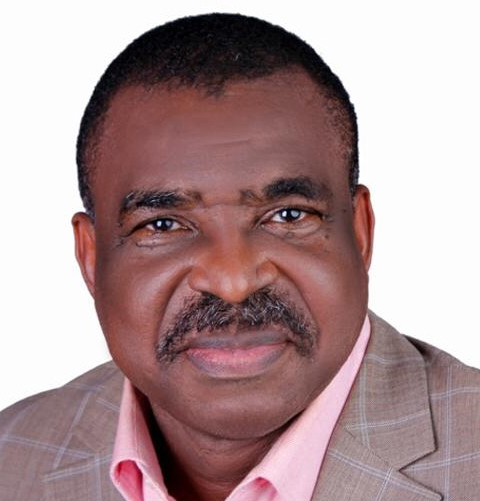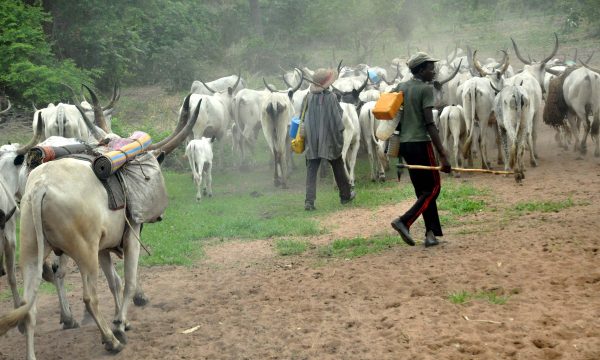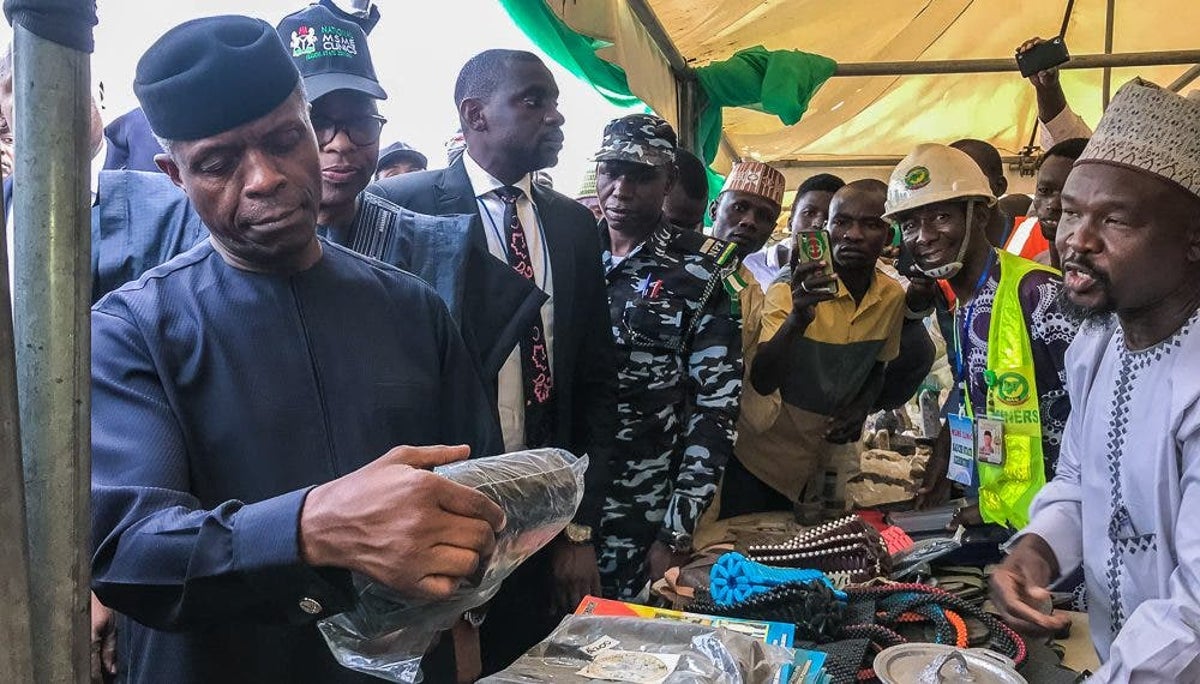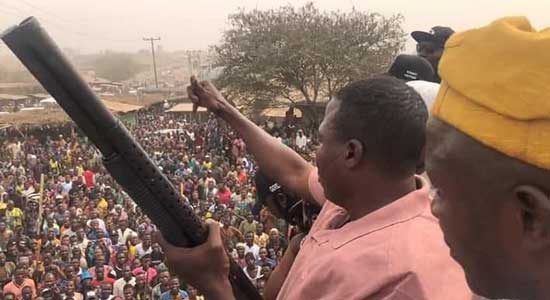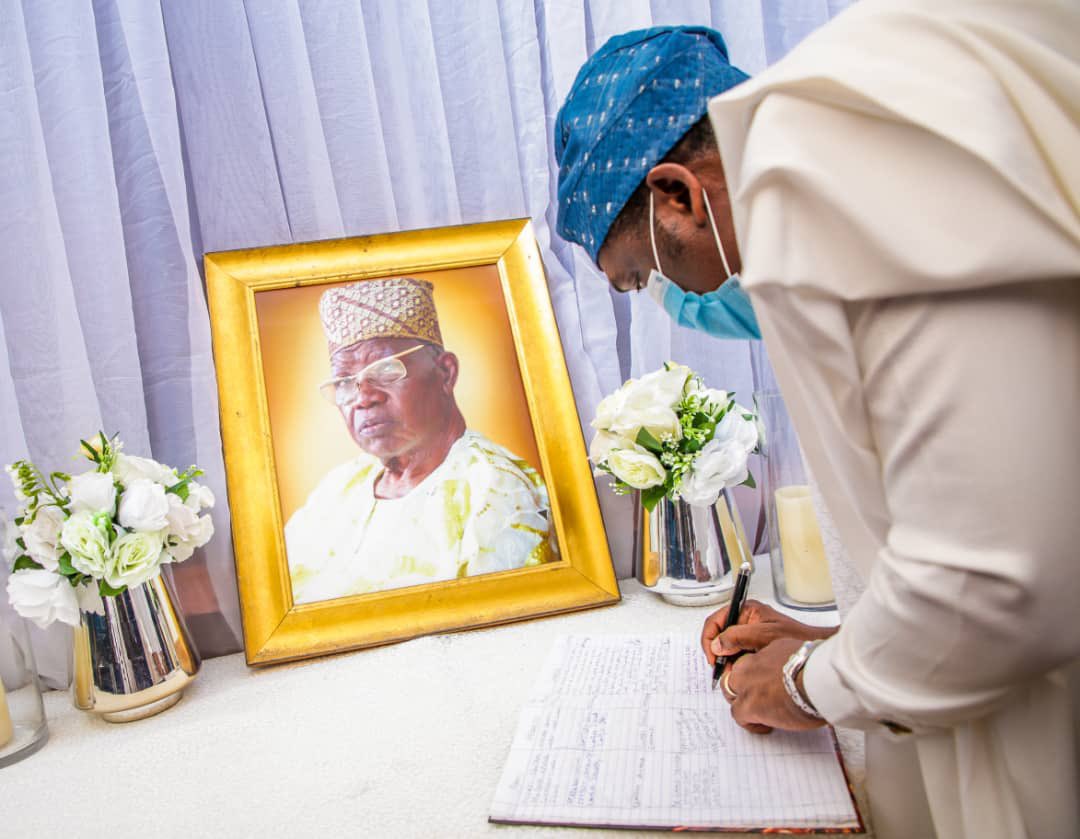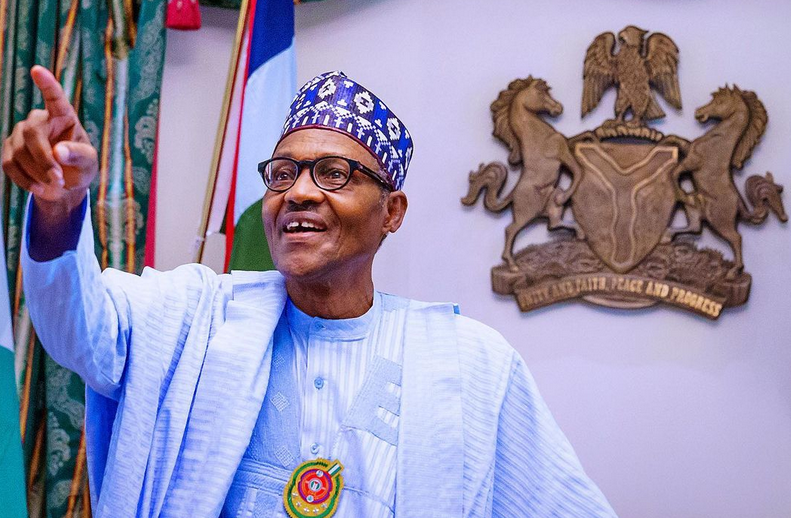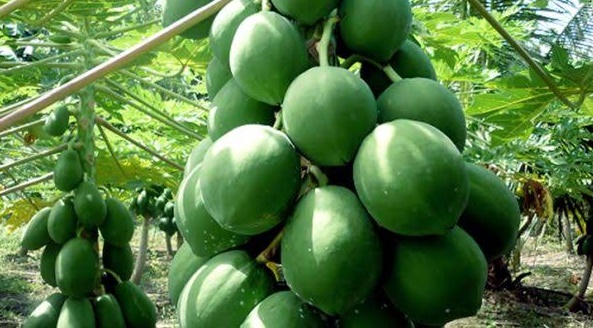Nobel laureate, Wole Soyinka’s country home in the forest area of lbadan, Oyo state capital, has reportedly been invaded allegedly by herdsmen.
Although the police have denied the invasion of Soyinka’s sanctuary, he has confirmed that the peace of his abode was indeed violated by herdsmen and their cattle herd, but he successfully repelled them.
Now, if indeed the residence of the Nobel laureate was breached by cattle herd and their rearers, it would be a new inglorious crown on the ongoing tension between herders and farmers in southwest Nigeria which has thrown up unlikely and accidental heroes like the governor of Ondo state, Rotimi Akeredolu and Sunday Ighoho, the new self-acclaimed generalissimo of Yoruba nation.
Akeredolu has become an usual hero for issuing a quit order to bandits disguised as herders from the forests of Ondo state and Ighoho, is also an accidental hero for giving an ultimatum to quit the forests of Oyo, where the presumed criminal elements masquerading as herders, are equally accused of unleashing mayhem on innocent indigenes of host communities.
Advertisement
Incidentally, the quit notices to herdsmen/bandits from the forests of Ondo and Oyo states are echoes of a similar order that had been given to bandits cloaked as herdsmen to quit Ekiti forests about 5 years ago by Ayodele Fayose, then Ekiti state governor.
So the pattern of criminality by bandits that take up abode in the forests and commit crimes in the townships and then retreat to the forests has persisted in the southwest for over half a decade. Bearing in mind that in 2015, chief Olu Falae, former secretary to the Federal government, SGF, and presidential candidate of the SDP in 1999 was kidnapped in his farm allegedly by herdsmen, who later released him, the current reason for clearing up the forests may become clearer. Even as Olu Falae escaped with his life to tell the story, in November 2020, which is five years after, his farm was again invaded by herdsmen a second time, and the farm and crops were set on fire by the bandits.
Often, victims of the killer herdsmen don’t escape with their lives. The outcome of an encounter with bandits, for the daughter of Rueben Fasoranti, a famous Yoruba political leader, was different as she did not live to tell the story.
Advertisement
In 2013, two years prior to Falae’s close shave with death in the hands of the outlaws, Mrs Funke Olakunri-Fasoranti was shot to death when she was traveling on Ore- Ondo expressway by suspected bandits masquerading as herdsmen.
Some of the alleged murders were arrested, but the outcome of the prosecution of the case has been woolly.
It is deeply concerning that all these dastardly acts by alleged bandits/herdsmen have been occurring in the forests of western Nigeria and indeed Nigeria as a whole for nearly a decade, yet the criminality was not nicked in the bud. That’s simply because a clear cut decision on how to deal with the crime and the perpetrators were being politicized. It is only now that the mayhem from armed bandits disguised as herdsmen are proliferating and popping up around the country with counter and defense actions against them by the kith and kin of their victims, that the authorities seem to be scrambling to find solutions, as reflected by the, scurry of meetings by northern governors forum and subsequently Nigerian Governors Forum.
Metaphorically, it is only after cancer has metastasized that the doctor’s attention is being sought with a view to curing the disease.
Advertisement
In any case, as the saying goes, it’s never too late to act, even though the current frenzied efforts by governors may be too little, too late.
Be that as it may, one pertinent question that’s begging for an answer is: can’t it be ascertained if the banditry being committed is by the real cattle herders or by criminal elements masquerading as pastoralists?
Therein lies the dilemma and the elephant in the room.
Now, to get to the root of the crisis, should Myetti Allah, the umbrella body of cattle herders allow the criminal activities of presumably a few misguided members or criminal elements that might have infiltrated its ranks be allowed to continue to tarnish their image resulting in genuine cattle herders becoming targets of anger and counter-violence by the kith and kin of the victims of their atrocities?
Advertisement
Or should the umbrella body self regulate by fishing out for discipline, those giving the majority a bad name?
In my view, those are necessary first steps towards reversing the current fast-moving train of violence that our beloved country seems to have boarded and which can only lead to a train station of perdition.
Advertisement
To be clear, all the quit notices were issued on the same case of invasion and the take over of the forests in the western region by heavily armed men disguised as herdsmen, making the hitherto serene forests toxic.
Could the forceful occupation of bandits of forests in Yoruba land be a case of another Sambisa forest in northeast Nigeria in the making in the southwest?
Advertisement
Bearing in mind that the dreaded forest in Borno state only became the home base for terrorists, cattle rustlers, and generally an ungoverned area when the outlaws were allowed to reign supreme over the vast virgin land, it is most likely that it is in the bid to prevent a similar scenario with Sambisa being reinvented in the southwest, that the quit notices to the bandits were issued by the authorities in line with the conventional wisdom-a stitch in time saves nine. That’s in addition to the fact that the escalation of the hostilities has been hindering the ancestral owners of the land from engaging in farming and hunting, which are their means of livelihood and sustenance, without which they would basically be doomed. So to the owners of the invaded forests, it is a question of survival.
That this malady has persisted for over half a decade, yet not much has been demonstrably done to arrest the situation before it deteriorated to its current crisis level is very dispiriting.
Advertisement
This is more so as the authorities should have learnt from the horrific experiences of the good people of Benue state where there has been a harvest of deaths in the Benue troughs arising from similar invasion of farms by marauders masquerading as herders.
Not taking preemptive actions by our leaders to avert the clear and present dangers illustrates the consistent pattern of cataclysmic management of the herdsmen-farmers crisis now bedeviling our country.
In fact, the failure of our leaders to manage the herders-farmers relationship reminds me of the failure to manage the COVID-19 pandemic properly by the 45th president of the USA, Donald J Trump resulting in the loss of his re-election bid last year, November.
Clearly, on the matter of security of lives and properties, our leaders have once again been derelict, particularly with respect to avoiding the very dangerous direction that the entire country currently appears to be heading, if concerted efforts are not made to halt the spiraling disorder.
For the umpteenth time, let me ask the question: is a scenario akin to the evolution of Boko Haram being re-enacted by playing politics with a crisis that is highly volatile and thus has the capacity to exact a huge death toll and threaten the continued peaceful existence of our country?
We will have ourselves to blame, if our leaders allow the crisis in the forests of Yoruba land to become another blithe or as incurable as the malignant tumor like the grievous harm being inflicted by religious insurgents such as Boko Haram and ISWAP that started in the northeast, before spreading to the rest of the north and is currently precipitating a debilitating and catastrophic damage to rest of our country; simply because the government has abdicated its responsibility to arrest the imminent danger.
To refresh the minds of readers about how our dearly beloved nation arrived at this despicable juncture where we are faced with a Hobbesian choice of life and death situation, despite concerted calls to avoid the looming disaster via practical advice by well-meaning Nigerians, please allow me to reproduce my nearly three (3) years old piece on the same issue that was first published widely on online and traditional media platforms since September 2018.
It’s titled Herdsmen Killings: “How Nigeria Can Move From Chaos To Community.”
In the piece, l addressed the crisis which had reached a tipping point about three years ago and proposed solutions such as the ones now being advanced by the northern governors’ forum and in particular, Kano state governor Umar Ganduje after their recent emergency meeting to address the increasing drumbeat of war sounding in Yoruba forests and indeed other parts of the southern region of the country owing to herdsmen menace.
If the practical advice contained in my piece was heeded about three years ago, many innocent lives could have been saved.
Here we go:
“As Nigerians, our common goal should be shared prosperity.
Since herdsmen are part of Nigeria, we must all do everything to integrate them into the loop of a prosperous Nigeria.
And one of the most appropriate and universally acknowledged pathways to prosperity, as validated by Bill Gates, one of the world’s richest men and founder of Microsoft is innovation.
Not just by harnessing natural resources like oil and gas, solid minerals or engaging in animal husbandry using crude methods, but by leveraging science and technology in the ways the production of goods or service delivery are carried out.
Arising from the above, to thrive in this new age of technology, as individuals and a nation, we must set our eyes on innovation.
It may not be the sort of high technology that was introduced by Mr. Gates through Microsoft that earned him (at one time) the title of the richest man in the world.
But even improvements that are a few notches above crudity, such as changing from nomadic herdsman-ship to ranching, could make a significant difference in the life of a nation such as Nigeria.
As part of his philanthropic endeavours, Mr. Gates recently identified Nigeria as a country with enormous potentials to lead Africa through the development of her sizable and young but unskilled Human Resources.
With a burgeoning youth population estimated to be in excess of 60% in a country of about 180 million people, Mr. Gates identified Nigeria as the most viable launchpad for Africa’s development and extended a hand of fellowship and partnership towards helping her harness the potentials.
But characteristically, some top apparatchiks in government who don’t share Mr. Gate’s point of view, ostensibly because of their restricted worldview constrained by some primordial sentiments, rebuffed him.
Fortunately, prosperity for all Nigerians does not solely depend on government, of which it is incumbent to provide the enabling environment for socio-economic growth and development.
Rather, the harnessing of prosperity potentials should be mainly driven by the private sector.
At this juncture, it is worth emphasising that Steve Job/Tim Cook of Apple, Bill Gates of Microsoft, Mark Zuckerberg of Facebook, Larry Page of Google and Elon Musk of Tesla amongst other multi-billionaires who got rich through technology developed in the USA, now being sold to the rest of the world, did not become wealthy on account of government patronage. But government created the enabling environment for the innovation and introduction of products and services with the universal appeal by the inventors which has also made the US very rich.
Put simply, the prosperity of the aforementioned American entrepreneurs was made possible through creative ingenuity facilitated by the government, which only created the enabling environment.
So Ibrahim Gambari, said it best when he recently posited that the solution to herdsmen and farmers clashes with the catastrophic fallouts evidenced by the monumental loss of lives, does not rest on government alone, but it needs to be driven by the private sector as well.
In aligning with Gambari, who was a United Nations (UN) undersecretary and as such, a top diplomat that has engaged in conflict resolutions all over the world, it’s about time Nigerians stopped considering the herdsmen killings and the colossal collateral damage to lives and properties from the narrow prism of ethnicity and religion.
Rather, the government should start viewing it from the wider optics of socioeconomic challenge, which needs a practical solution.
The search for a solution should be devoid of ethnic or religious attachments but driven by the objective of converting an existential crisis into an economic opportunity.
In my considered opinion, that is the clearest pathway to a sustainable solution to the menace of wanton killings by herdsmen that is unduly sapping the energy of the country’s security agencies.
It does not help that our President, Muhammadu Buhari, keeps attributing the human carnage arising from herdsmen killings in the Sahel and plateaus areas of our country to the drying up of Lake Chad and influx of displaced Libya-trained militia, because it is way beyond that.
Those may be the primary or remote causes of the herdsmen/farmers clashes, but the crisis has become hydra-headed and government authorities must stop living in denial by failing to recognise that the politics of religion and ethnicity which has polarised the nation is the current energy fueling the security chasm.
For instance, was Lake Chad not drying up, and was Libyan militia not existing before the advent of this administration? Why were the herdsmen not as ferocious and as emboldened as they are now?
I understand that the herdsmen and local indigenes conflicts in the Sahel and plateau are as old as the migration of the Fulani from Fouta Djallon mountains in the West African country of Guinea, centuries ago.
After the initial armed conflicts, the Fulani migrants and their Hausa hosts learnt to live in harmony with the neighbouring Tiv, Jukun, Idoma, Berom and Angas in the Middle Belt and Sahel regions of Northern Nigeria.
It’s noteworthy that tension and animosity associated with settlers and their hosts never degenerated to the current level, except during the jihad.
Obviously, something has gone awry in the polity in the past three and half years and the reason can be drilled down to what l would like to term leadership miasma.
It may not be deliberate, but it is possible that President Buhari’s body language is sending the wrong signal to the herdsmen.
For instance, at one point our president and commander-in-chief of the armed forces of Nigeria expressed concern that the herdsmen killings were politically motivated. He then laid the blame on saboteurs from the opposition parties whom he accused of trying to destabilise his government.
But like the earlier attribution of the killings to climate change and Libyan militia, the claim that the killings were politically motivated has been without conclusive evidence as it should.
Thereafter, Mr. President seemed to have reversed himself in the course of his recent trip to China by reportedly attributing the killings once again to climate change and blaming the media for orchestrating the violence.
That’s the same line our president toed when he was hosted by the US President, Donald Trump in the White House earlier in the year; he did the same thing while he was attending the African Union meeting in Ethiopia, just as he also did in the UK during his last visit.
It would appear as if Mr. President has two views on herdsmen killings- one for his international audience and another for the local audience.
For his international audience, climate change and Libyan militia are the culprits and for Nigerians, he insists that the killings by herdsmen are motivated by political opponents who want to destabilise his government.
Assuming I’m correct in my assessment, the approach is confusing and would make finding a solution very difficult, if not impossible.
As such, Mr. President must make himself clearer.
And that’s a task which Presidential spokesmen – Femi Adesina and Garba Shehu – must redouble their efforts to achieve, so that majority of Nigerians would stop misunderstanding their president.
There is no better evidence of a disconnect between the current leadership and the majority of Nigerians than the polarisation of the country along ethnic and religious lines that now defines our country.
Is the indisputable fact that a large proportion of Nigerians feel alienated by the leadership not chaotic?
Is that not the justification for the threat of secession by the Igbo via the action of the Indigenous People of Biafra (IPOB) movement that left a bad taste in the mouth of both the secessionists and security agencies that have been accused of human rights abuse in light of the deadly force applied in dealing with the agitators?
In my estimation (which hopefully is not naive) polarising the country along sectarian fault lines is an antithesis to what President Buhari stands for as reflected by his oft requoted inaugural day speech “l belong to no one, l belong to everyone”.
Without further equivocation and in the light of the foregoing, the Presidency must elect to make some progress and stop considering the national malady of herdsmen killings from the narrow perspective of climate change and fallouts of Libyan militia only.
The havoc being wreaked on unarmed Nigerians by herdsmen militia who are systematically hewing down and hacking to death fellow Nigerians is a socioeconomic issue that should task the creativity of our development economists and strategists.
It is based on the strength of the above precept that I’m proposing a concept that l would like to refer to as FulaniCapitalism as a viable solution to the seemingly intractable herdsmen killings that have practically put our country in perpetual mourning mode as hardly any day passes by without deaths arising from killer herdsmen.
Before proceeding to the nitty-gritty, permit me to introduce you to the concept of FulaniCapitalism which is a variant of Africapitalism-a pseudo or hybrid business/social investment model being promoted by Tony Elumelu, chairman of Heirs Holdings.
As earlier stated, the underpinning philosophy behind FulaniCapitalism is similar to the raison d’être for Africapitalism, which is the creation of job opportunities for Africans by Africans in ways that the host communities of the business are not exploited but empowered by the presence of the corporate entity.
A sort of symbiotic relationship between entrepreneurs and host communities.
Fulani Capitalism is conceptualised to catalyse and drive the concept of cattle ranching to discourage or displace the current nomadic practice of animal husbandry. It is so named because it is the Fulani that are undeniably, inherently the predominant pastoralists in Nigeria.
The whole idea is to overtly or covertly persuade the well-heeled or deep pocket Fulani men and women to strategically invest in ranches to facilitate the change of the lifestyle of the nomadic herdsmen and offer them more reliable as well as better return on their investments and efforts.
Given the strategic role that cattle ranches, (as opposed to nomadic animal husbandry) can play in stemming the ugly side of human carnage arising from herdsmen killings, investing in ranches (confining animal husbandry within a farming space) by successful men/women of Fulani extraction needs no further elucidation because it is both a social and economic investment.
By this, l mean that rather than wait for the government to set up ranches, Fulani men and women of means (who are in their legions) should make deliberate and conscious effort to invest in ranches, which would serve as sanctuaries for cows and those who tend them because it is financially rewarding.
Aside from the financial returns, it would serve as a veritable means for safeguarding the livelihood of their people whose mainstay is animal husbandry, and which they are still practicing in the same nomadic and primitive manners that their forebears did centuries ago and now constituting a threat to peace and security.
So far the balance of loss of human lives is in favour of the herdsmen who are rampaging all over the country, particularly the Sahel and plateau (for their green pastures) and leaving sorrow, blood, and grief in their trail.
But the first mover advantage which the herdsmen are currently enjoying would not be perpetual, if and when their victims begin to fight back.
In light of the frightening prospect of the conflict escalating to unimaginable proportions, how do we avert what seems like an inevitability if the killings by herdsmen go on unabated?
I’m convinced that Nigeria can move from the current state of chaos to community through a strategy of shared social investments. That’s assuming we are ready to change how animal husbandry is practiced by leveraging science, technology and capitalism.
It is the case that I’ve tried to make through the FulaniCapitalism initiative because as the saying goes, ‘a stitch in time, saves nine’.
Although Hausa/Fulani men are known to be great entrepreneurs, (Aminu Dantata, lsiaku Rabiu etal who were great merchants of yore) they seem to be underestimating the money-spinning or commercial potentials of their cattle assets, if properly harnessed through innovative and technological ways.
Many of us tend to have missed an interesting point of fact which is that it is on account of its cattle business (dairy) being whittled down that Canada is opting out of the US President, Donald Trump’s reformed North American Free Trade Agreement (NAFTA).
With the new arrangement, Canada’s dairy business derived from cattle is threatened and it is therefore rejecting the deal.
So the cattle business is big business.
Conversely, in Nigeria where we are blessed with the abundance of cattle and which is supposed to be a blessing, it has become the source of strife and violence. That’s simply because we are yet to apply science, technology and capitalism in harnessing the huge potentials inherent in animal husbandry.
Why for instance can’t fresh milk from the ranches in the north be served every morning not only in northern cities like Abuja but also in major Nigerian cities in the far south like Lagos, Ibadan, Benin, Asaba, Warri, Enugu, Calabar, and Port Harcourt?
With the ongoing resuscitation of the railways across Nigeria by the government, the distribution of fresh milk daily is highly possible when pasteurised containers are included. That’s also one way that beef cold cuts and stakes imported from South Africa and Europe being sold in the numerous hypermarkets dotting major cities can be replaced with made in Nigeria beef that is comparable to any in the world.
Also, Switzerland, a country in Europe that we all envy is apart from being the home of fabulous wristwatches and safe haven for slush funds, is also famous for dairy-based chocolate.
Many years ago, research institutions aimed at enhancing the harnessing of economic activities rampant in certain geographic zones of Nigeria were established.
I’m referring to the International Institute for Tropical Agriculture (IITA) established in 1967 in Ibadan, Oyo State and the Nigerian Veterinary Research Institute (NVRI) set up in Vom, Plateau State in the 1920s.
There are other such research institutes all over the country such as the Oil Palm Research Institute in Ajagbodudu, near Benin city, Edo State. But for the purpose of this article, allow me to focus on only two dedicated to agriculture, particularly cash crop farming and animal husbandry.
While IITA is focused on research that would create innovations on cash crops such as cocoa, cassava, etc., common in the southwest and Midwest, the veterinary institute in Jos is meant to pursue research into how higher productivity and improved yield from the abundant cattle in the north, can be better achieved.
If you ask me, in the case of NIVR, Vom established nearly 100 years ago, the purpose for setting up those institutions have remained largely unachieved as evidenced by the fact that farming and animal husbandry have not risen above primitive levels as envisioned by the founders.
And the culprit that easily comes to mind is resistance to change by Nigerians.
This lack of response to the stimuli of change is perhaps derived from how steeped we are in our ancient cultures which has made us impervious to change. It could also be that not enough effort has been made by way of enlightenment from the research institutions.
In my personal judgement, l would tilt the blame more in the direction of inadequate enlightenment. That’s because the same Nigerian farmers and herdsmen that have remained rooted in their primitive practices have been successfully wooed by cell phones operators like MTN, Glo and Airtel to the extent that farmers and herdsmen now proudly move around with cell phones.
Obviously, herdsmen and farmers through enlightenment have now recognised the benefits of telecommunications and the ease of marketing their livestock online which the telecom firms pitch to them through public enlightenment activities leveraging mass communication channels like billboard, radio and TV advertisements.
With the huge number of cattle in the north, why should dairy-based products firms in Nigeria like Nestle, WAMCO – owners of Peak milk, FrieslandCampina, Promisador makers of Cowbell milk, etc continue to import concentrates from Holland, etc when fresh milk can be harvested from cattle in northern Nigeria?
Why can’t they embark on backward integration programmes by investing in ranches in the north as government is currently doing with rice farming?
Obviously, the continuous importation of such items that could be sourced locally, resulting in the unbridled exportation of our scarce foreign exchange, would continue to be the bane of our country, unless strategies to stem the financial hemorrhage such as backward integration through ranching is pursued vigorously.
Is the pressure on Nigerian treasury by importers not the reason the Central Bank of Nigeria (CBN) intervenes in the foreign exchange market weekly to stabilise it with hundreds of millions of dollars?
The N220 billion set aside by the CBN (MSME intervention fund) of which a lot was invested in rice farming in several states in the north, including Kebbi as well as Lagos states should also be applied in animal husbandry via the introduction of cattle ranches as opposed to sticking to the ancient practice of herding in the 21st century.
Apart from the concept of Fulani Capitalism, which I’m advocating, the government should collaborate with the NVRI, Vom to move the ranching initiative forward through extension services.
According to data from the Nigerian Bureau of Statistics (NBS), Nigeria spent about N225 billion in the first quarter of this year alone importing agricultural products. Ironically, Nigeria’s comparative advantage in international trade is supposed to be in agriculture. Yet, our country spends nearly a quarter of a trillion naira in just one quarter (four months) importing food from other countries. It’s such a paradox that makes our country look pathetic to close observers.
How can a country that has the potentials to be a net exporter of food be listed amongst nations shackled by food insecurity?
As the government in power is ostensibly driven and anchored on change, this humble submissions on how to change the narrative of animal husbandry from nomadic cattle herdsman-ship, (the primary cause of the killings generating chaos in our society), to that of ranching in our community, leveraging science, technology and capitalism, should be evaluated for possible adoption.
And for the good of our country and all the numerous ethnic groups and religions, that assessment should be carried out with no sectional sentiments or bias.
Rather, pragmatism, as well as national interest, should be placed above all other considerations.”…
Sadly, rather than the menace of Herdsmen Terrorism which created high tension in 2018 when l wrote the article ebbing, it has spiked hence the reprisal attacks on herdsmen that l predicted three years ago, but which fell on deaf ears is now playing out.
How many more innocent Nigerians would have to die before our leaders take action?
Responding to the rising incidents of violent clashes erupting in the forests between ancestral landowners in South-West, South-South and South-East Nigeria and those they consider to be bandits, but very likely to be herdsmen, northern governors forum that has been reluctant to act on a deluge of advice earlier offered has made the following statement after their meeting. “In the face of the recent worrisome developments, therefore, the Northern Governors Forum calls for calm and cautions Nigerians particularly those in the affected areas who might have been aggrieved or targeted to exercise restraint.”
Governor Nasir El- Rufai of Kaduna, whose state is more or less ground zero for ethnic clashes resulting in lost lives in huge proportions, also weighed on the videos video of lynching circulating in the social media with the following admonishment.”In difficult times, we must uphold the right of everyone to live, with security and safety.”
Wole Soyinka whose forest home in Ibadan experienced an invasion by herdsmen and their cattle has now debunked the police claim that his home was not violated by herdsmen and their cows. The Nobel laureate who has been outspoken about the combustible nature of the clashes released a statement in which he implored the government to get serious:
“Getting serious means seeking with a sense of urgency, ways of terminating mayhem, impunity, and the homicidal culture being imposed on us through some near cultic business minority who just happen to trade in cattle. It means not giving up on peaceful solutions, but also being prepared for the worst”
He concluded by stating that “Cattle imperialism under any guise is an obscenity to humanity.”
In a letter titled APPEAL TO ACT BEFORE HERDSMEN DRAG NIGERIA INTO A CIVIL WAR, Benue state Governor, Emmanuel Ortom whose state has been the epicenter of herders -farmers conflicts that resulted in the death of close to farmers after a bloody clash between herders and farmers, pleaded with President Buhari to ensure that justice, fairness, and equity are evident in all issues relating to public safety and security.
The most outstanding part of Ortom’s statement in my view is item no 11 in the Open Letter to mr president released on Thursday.
“Sir, we all remember the wise counsel of Nigeria’s former Permanent Representative to the United Nations, the late Alhaji Maitama Sule, when Northern Leaders Forum visited you as the President-Elect in 2015. He said, inter alia “…With justice, you can rule Nigeria well. Justice is the key. If you do justice to all and sundry, and I say all and sundry. If you’re going to judge between people, do justice irrespective of their tribe, religion or even political inclination. Justice must be done to whosoever deserves it.”
The late Maitama Sule’s candid advice is a very profound leadership aspiration which seem to have been tossed into the dustbin, but which is even more relevant and poignant today than it was in 2015 when the wide counsel was offered.
Coming out of their emergency meeting of Thursday 11/2021, Nigerian Governors Forum, led by Ekiti state governor, Kayode Fayemi released a statement containing the following resolution:
“State governments are encouraged to put in place systems to accelerate the grazing initiative of the National Livestock Transformation Plan and ranching in the country.”
A positive fallout of the crisis is that Kano state governor, Umar Ganguje has offered a dynamic and innovative elixir that is in line with my recommendation since 2018 that sanctuaries should be created for animal husbandry and herders should be registered for proper monitoring so that the real herdsmen can be separated from the criminal elements amongst them.
Here is how Ganduje put it :
“These killings must stop. We cannot afford to continue to witness these senseless killings in the name of Fulani herdsmen and farmers clash over lack of grazing land while we have a place like the Falgore Game Reserve underutilized.”
According to the governor “A Cattle Intervention centre has been established to address the challenges associated with rumination of herdsmen within Kano. Just recently, we sponsored the training of over 61Fulani who were sent to Turkey to learn artificial insemination”
At last, our leaders are putting on their thinking caps.
And the implementation of such a dynamic policy in Kano state, which could have prevented our countrymen and women from the current imbroglio has been overdue.
It may be recalled that Ibrahim Gambari, before becoming Chief of Staff, CoS to president Buhari, had also proposed a Public-private partnership in the management of animal husbandry. And I referenced his proposition in my 2018 piece which l reviewed for this intervention.
In Gambari’s new role(appointed May 2020)he is now in charge of the engine room in Aso Rock Villa seat of power.
So he is in a prime position to put into practice what he preached way back in 2018.
With his pedigree as a venerable statesman and policy wonk, who is currently an Aso Rock Villa insider, I’m willing to wager a bet that the highly informed Gambari would push the ideas that he had canvassed as an outsider. So, I’m convinced that modern-day management of animal husbandry like the one Ganduje has vaunted would be proposed to his principal-president Buhari and the Kano model may likely be implemented across the board in all the northern states where cattle rearing is endemic. That’s assuming the CoS is able to persuade his boss, the leader of our country and the commander-in-chief of the armed forces on the need to buy into the more realistic paradigm shift.
Events in the past couple of weeks compel speedy action as a delay is dangerous since the nation seems to be on a rollercoaster descent towards anarchy since we as a country are presently, literarily seating on a keg of gunpowder with any intentional or accidental spark resulting in a blowout.
For me, the greatest revelation or takeaway in all of these pastoralists and farmers’ conflicts across Nigeria is that we have suddenly realized that have huge arable and unharnessed land all over our country.
The forests now being ‘discovered’ by herders/bandits starting from the savannah of Sambisa in Borno state to the dense forests in the middle belt, and the rainforest of Ondo in the southwest to the mangrove of Ughelli in Delta state, have been fallow, perhaps for centuries. Yet Nigeria and indeed Africa remain food insecure.
Traveling from the Uk to France via euro tunnel, one’s attention would be arrested by the rolling planes of cultivated land with crops sprouting or being harvested between London, UK and Calais in France.
No wonder food security is one of the strengths of the European continent.
By contrast, try traveling by road through Jos in plateau state to Bauchi, with Maiduguri in Borno state as your ultimate destination. All you would see is wild, dense forests and savanna, not farms or farmers.
The same applies when you travel by road from Agbor in delta state via Auchi, in Edo state to Mokwa in Kogi and Ilorin in Kwara states before getting to Abaji etc in the Federal Capital Territorial, FCT with Abuja as a final destination.
There are hardly any mechanized or organized farming.
You will rarely see tractors or even horse-drawn ploughing implements.
The story is not different when one travels by road from Abuja via Nasarawa state to Makurdi in Benue state. All one would be inundated with are wasting crops and other food products, especially citrus growing widely.
If the British colonialist made our farmers focus more on cash crop production like groundnuts, cashew nuts, cotton, sesame seeds etc, which were the objects of their key interest, the colonialists have been gone for over 60 years, why have we not refocused our farming to food production to guarantee food security?
That’s the critical question to which our leaders since independence must provide answers.
If the vast and virgin forests of Nigeria now being converted into sanctuaries by outlaws – bandits, kidnappers, ritualist etc – basically because they have been unexplored – were to be put into productive use for food production, Nigeria would be food secure and employment rates would also be very robust with our eligible workers fully engaged in farming and food processing activities.
The unfortunate incidents of attacks on herdsmen in the territories that they have been terrorizing in the past few weeks are telltale signs that our country may actually be on a slippery slope into becoming an ungoverned space as frustrated citizens may be taking the laws into their hands through self-help.
The bandits disguised as herdsmen are behaving in the manner that Boko Haram first of all occupied Sambisa forest unchallenged before it started seizing inhabited territories starting from hamlets, villages and towns.
That’s basically because no decisive action was taken to address the dissent that degenerated into religious unrest and subsequently into the insurgency/movement.
Today, it’s only the blind, deaf and dumb that can’t see the present danger of herder- farmers conflicts evolving into an unnecessary war under our own very eyes and noses. And if like the apparently intractable religious insurgency, we don’t take the required bold stems towards stopping the ongoing macabre dance in the forests, posterity will not forgive our current leaders.
It is not enough that the governors have held another meeting where they’ve made fanciful declarations about lofty and grandiose plans to put security and safety of lives and properties in our country back on even keel.
As things currently stand, it behooves of our leader, President Buhari on whose desk the buck ends to resolve to deescalate the crisis by taking a stance that would be fair to all, before the current peace of the graveyard is broken or hostilities snowball and fall off the cliff where it is presently precariously perched.
The unvarnished truth is that the critical mass of Nigerians that are presently beleaguered, traumatized and dehumanized are dying to hear from president Buhari, who needs to literarily steer the ship of state currently headed towards the rocks safely to the shores by declaring his neutrality in the pastoralists and farmers conflict matter.
MAGNUS ONYIBE, an entrepreneur, public policy analyst, author, development strategist, alumnus of Fletcher School of Law and Diplomacy, Tufts University, Massachusetts, USA and a former commissioner in Delta state government, sent this piece from Lagos.
Views expressed by contributors are strictly personal and not of TheCable.
